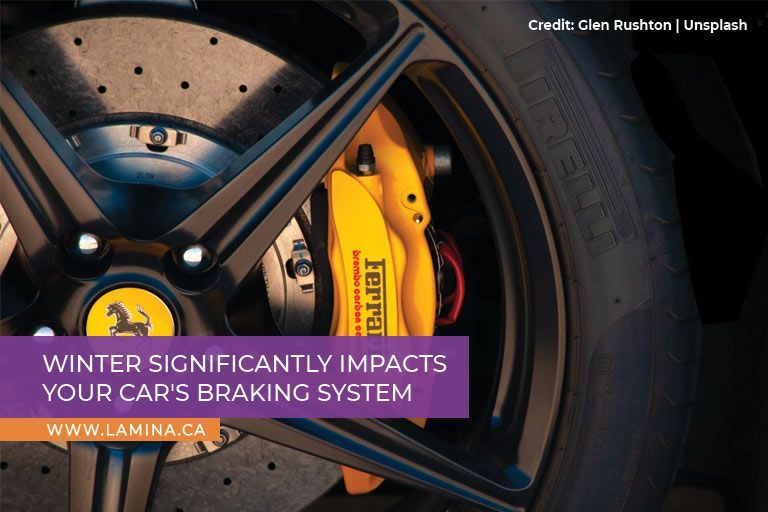As the vibrant hues of fall fade and winter approaches, our driving habits and car maintenance needs to undergo a significant shift. One crucial aspect to consider is your vehicle's braking system. Winter throws a whole new set of challenges at your car, and ensuring optimal brake performance becomes paramount for safe driving. This article delves into the world of winter brakes, explaining why switching them out for the season might be a wise decision and equipping you with the knowledge to make an informed choice for your car and whether or not you need to turn to
Ontario payday loan alternatives online to fund the switch.
The Chilling Impact of Winter on Your Brakes
Winter's frosty embrace doesn't just affect cozy sweaters and hot cocoa cravings; it significantly impacts your car's braking system. Here's how:
Friction is the foundation of braking. When you press the pedal, the brake pads rub against the rotors, converting your car's kinetic energy (movement) into heat energy. Lower temperatures, (which can reach up to
-30°C on the coldest days in Canada), a can stiffen the brake pads, reducing their overall friction coefficient. This translates to a longer stopping distance, a potentially dangerous situation on slippery winter roads.
Road crews employ de-icing chemicals and salt to combat ice and snow. While effective at maintaining road safety, these substances can wreak havoc on your braking system. The salt can cause corrosion on vital brake components like callipers and rotors, compromising their efficiency.
Melting snow and ice create puddles and slush on the roadways. This moisture can seep into your brakes, leading to a spongy brake pedal feel and reduced responsiveness. This can be particularly disconcerting during emergency braking situations.
Debunking the Myth: Universal Brakes for All Seasons
While some might advocate for year-round use of the same brake pads, winter presents a compelling argument for a more specialized approach. Here's why all-season brakes might not be the optimal choice for winter:
Standard brake pads are designed for a wider range of temperatures. However, winter demands a specific type of brake pad compound. Winter-specific brake pads often utilize a softer compound that performs better in colder temperatures, offering improved braking performance when the mercury dips.
Traditional brake pads are susceptible to "brake fade" under extreme heat. While this isn't a major concern during regular winter driving, situations like long downhill stretches or repeated braking can cause them to overheat and lose effectiveness. Winter-specific pads are formulated to resist fade better, ensuring consistent performance.
Winter's brutal conditions can also accelerate rotor wear. The constant battle with salt, slush, and extreme temperatures can lead to warping or uneven wear on the rotors, leading to vibrations in the brake pedal. Replacing rotors alongside winter brake pads might be necessary for optimal braking performance.
The Benefits of Switching to Winter Brakes
Investing in a dedicated set of winter brakes comes with a plethora of advantages:
Winter brake pads, with their softer compound, deliver superior stopping power in cold weather. This translates to shorter stopping distances on ice and snow-covered roads, bolstering your overall driving safety.
Knowing your car has winter-ready brakes can significantly elevate your confidence behind the wheel. Reduced stopping distances and a firmer pedal feel inspire peace of mind when navigating treacherous winter weather.
Winter-specific brake pads are designed to handle the harsh conditions better, ultimately extending the lifespan of your regular brake pads. This translates to long-term cost savings for you.
- Preserving Your Investment
The corrosive effects of road salt can take a toll on your car's braking system. Winter brake pads act as a barrier, minimizing the damage caused by these elements and protecting your car's braking investment.
Making the Switch Seamless: Tips and Considerations
If you've decided to switch to winter brakes, here are some helpful pointers:
- Consult Your Owner's Manual
Your car's manual is a valuable resource. Refer to it for specific recommendations concerning compatible brake pads and rotors for your vehicle.
- DIY or Professional Installation
Changing brake pads yourself is possible with some mechanical knowledge. However, if you're unsure, err on the side of caution and seek professional help from a qualified mechanic.
Winter brake pads vary in price depending on your car model and the brand you choose. Do some research to find a cost-effective option that balances quality and affordability.
Winter Brakes and Affordability: Don't Let Cost Stop Your Safety
The idea of an additional expense might be a concern. Here are some ways to navigate the cost of winter brakes:
Schedule your brake inspection well before winter arrives. This allows you to plan your budget and avoid last-minute costs associated with sudden repairs.
Get quotes from multiple mechanics or dealerships to ensure you're getting the best price for the service.
- Consider DIY (Do-It-Yourself)
If you're mechanically inclined and comfortable working on your car, replacing brake pads might be a viable option. However, ensure you have the proper tools and knowledge to complete the job safely.
Resourceful Online Loan Options







